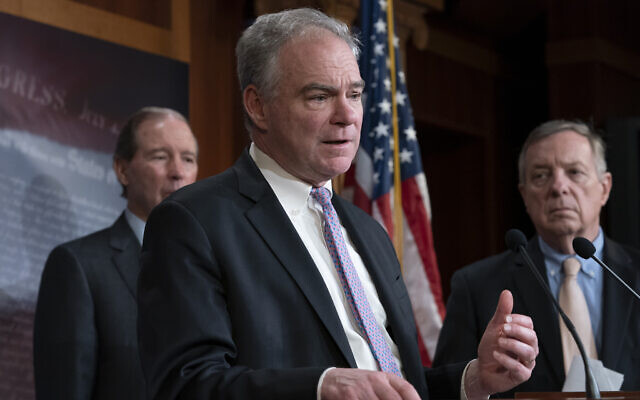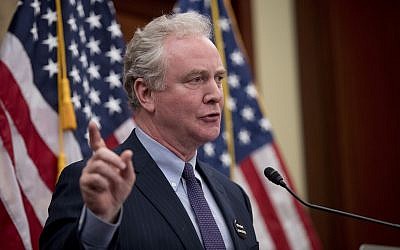18 Democratic Senators Warn Annexation Will Damage, Erode US-Israel Relations
In missive to Netanyahu and Gantz, top Democrats Warren, Sanders, Kane and others say move would ‘betray our shared democratic values’.

In a letter to Israel’s leaders, a group of 18 Democratic senators have warned of the detrimental consequences of Israeli annexation of parts of the West Bank to the Jewish state’s “bilateral and bipartisan relationship” with the United States.
The senators, who included Bernie Sanders, Elizabeth Warren, Dick Durbin and Tim Kaine, expressed “grave concern” at the prospect of Israel annexing its settlements and the Jordan Valley, saying it “would have a clear impact on both Israel’s future and our vital bilateral and bipartisan relationship.”
They warned it would “betray our shared democratic values by denying Palestinians’ right to self-determination in a viable, sovereign, independent and contiguous state,” and said it would likely “erode” the special relationship between the nations.
“As friends and supporters of Israel, we caution you against taking unilateral steps that would fray our unique bonds, imperil Israel’s future and place out of reach the prospect of a lasting peace.”

Democrats and liberal pro-Israel advocates are largely united in their opposition to annexation but splintered over what the US policy response should be if Israel implements Netanyahu’s plan — and Democrats take back power in 2021.
Other Democrats, have said that US aid to Israel shouldn’t be touched and that there would be other levers to sway Jerusalem, including by not shielding it from censure over the matter at international fora such as the United Nations.
Biden’s senior foreign policy adviser Tony Blinken said last month that the presidential candidate opposes unilateral annexation as it would “make the prospect of a negotiated two-state outcome less likely.”
On Tuesday he told Jewish donors: “I do not support annexation,” adding that Israel needs to “stop the threat of annexation and stop settlement activity because it’ll choke off any hope of peace.”
He added that if elected president, he would “reverse Trump administration steps which I think significantly undercut the prospects of peace.”
Earlier this month the American Israel Public Affairs Committee released a statement that sought to convince lawmakers not to push for any changes to US-Israel policy as a reaction to annexation.

“Some have proposed reducing our ties with Israel because they object to the potential decision by Israel’s leaders to extend Israeli sovereignty to parts of the West Bank,” the statement said. “Doing anything to weaken this vital relationship would be a mistake.”
Last month, Netanyahu struck a complex power-sharing deal with Blue and White party leader Gantz. Under the arrangement, the prime minister can bring up his proposal to annex some 30 percent of the West Bank — all the settlements and the Jordan Valley — on July 1, when he will need approval from either the cabinet or the Knesset.
Until then, the government’s focus is supposed to be exclusively on responding to the COVID-19 pandemic, but that still leaves plenty of time for the government to annex disputed West Bank territory before November’s US election.
While the move would be in accordance with the Middle East plan US President Donald Trump unveiled in January, which endorsed extending Israeli sovereignty over roughly 30% of the West Bank, it would fuel tensions with the Democratic party, former Democratic officials and progressive Israel activists say.
“I think there is a consensus among Democrats that unilateral annexation is a bad idea and they oppose it,” Obama administration envoy to Israel Dan Shapiro told The Times of Israel. “Israel, if it decides to undertake this, would be doing it with the knowledge that one entire political party, including its closest friends and strongest supporters in that party, view this as a very negative development and very harmful to the US-Israel relationship. So that would be unfortunate.”
Democrats have been on record making that point for months now. In December, the House passed a resolution opposing annexation, down party lines, with overwhelming support from Democrats, including staunch supporters of Israel, like New York Rep. Eliot Engel, Florida Rep. Nita Lowey and Illinois Rep. Brad Schneider.

In recent days even Trump administration officials have appeared to seek to dampen expectations that Washington will quickly green-light the move without any progress in negotiations between Israel and the Palestinians.
The State Department’s chief spokesperson said last week that any action should be part of discussions between Israel and the Palestinians on the Trump administration’s peace plan.
During the 2020 Democratic party primary campaign, several of the leading candidates floated the idea of slashing aid to Israel if it extended sovereignty to the West Bank settlements, including Vermont Senator Sanders and former South Bend mayor Pete Buttigieg, signaling support for the idea among segments of the Democratic caucus.
Biden himself has called the idea “outrageous” and said he wouldn’t touch the aid.
Eric Cortellessa contributed to this report.



comments